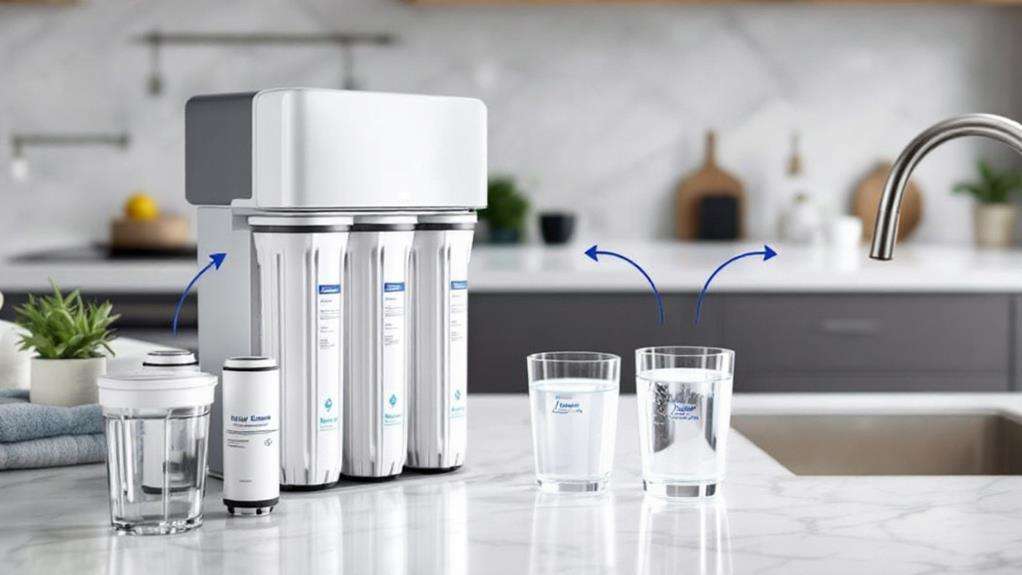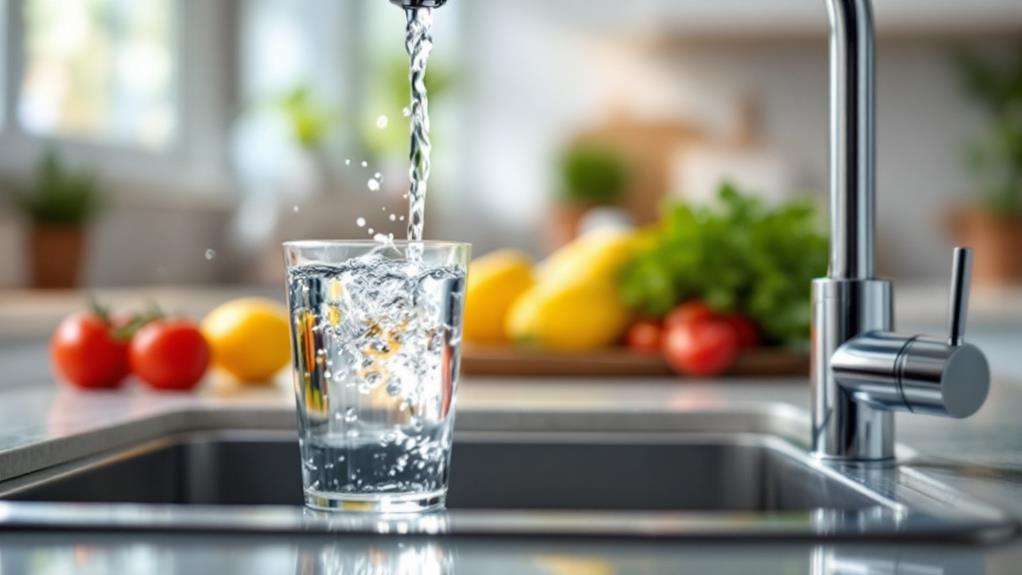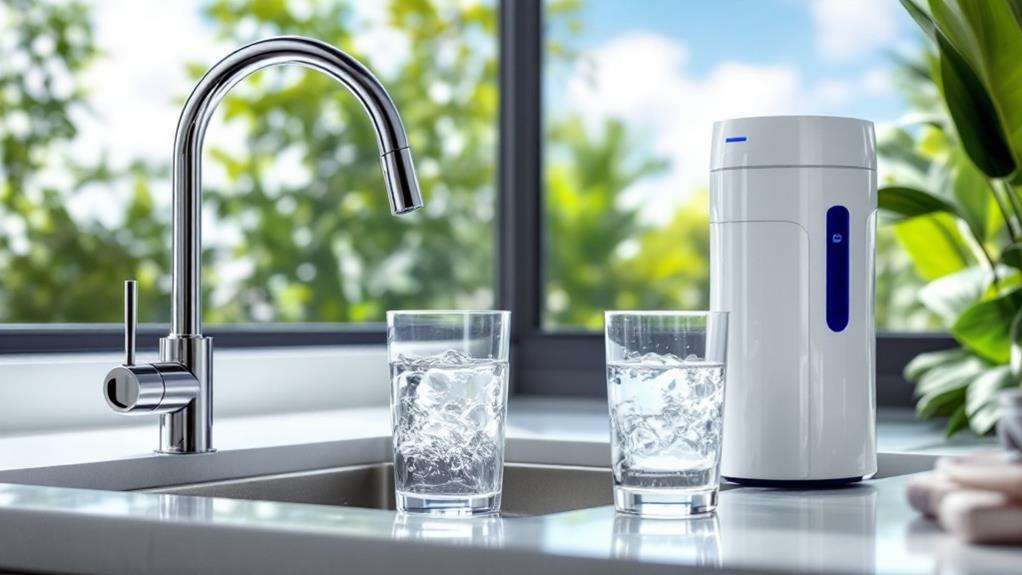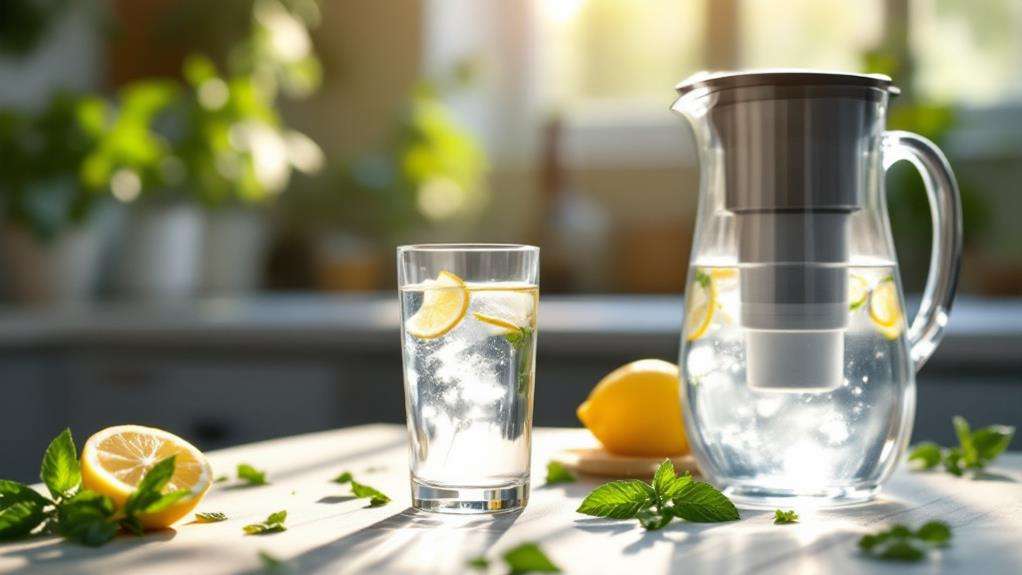How to Improve Your Water Quality With a Home Filtration System
To improve your home's water quality, install a filtration system adapted to your needs. Start by testing your water to identify contaminants. Choose between whole-house systems for comprehensive protection or point-of-use filters for targeted purification. Consider reverse osmosis for high-level filtration or activated carbon to remove chlorine and improve taste. Guarantee proper installation by a licensed plumber and sustain the system regularly. Whole-house filtration offers benefits like improved water for all uses and extended appliance lifespans. Don't forget to investigate water descaling solutions for hard water issues. The right system can revolutionize your water quality and daily life.
Understanding Water Quality Risks
The murky depths of your home's water supply may harbor hidden dangers. Understanding water quality risks is pivotal for protecting your health and home. Contaminated water can pose serious threats, ranging from immediate discomfort to long-term health issues. You might experience skin irritation or notice your hair becoming dry and brittle after bathing in unfiltered water. More alarmingly, contaminants like lead can seep into your system, leading to poisoning.
Your skin isn't just a barrier; it's a gateway for harmful substances. As you shower or bathe, your body absorbs contaminants through your pores, potentially causing adverse health effects. Over time, exposure to chemicals and microorganisms in unfiltered water can have lasting negative impacts on your well-being. Beyond personal health, excessive minerals in your water supply can wreak havoc on your home, corroding bathroom fixtures and appliances.
To safeguard your health and property, it's imperative to invest in a proper water filtration system. By implementing an all-encompassing solution, you'll guarantee clean, safe water for drinking, cooking, and bathing. Don't underestimate the significance of water quality – take action to protect yourself and your loved ones from these hidden risks.
Types of Water Filtration Systems
Now that you're aware of the potential risks, let's investigate the various water filtration systems available to safeguard your home. Whole-house systems offer comprehensive thorough protection, treating all water sources in your home and removing a wide range of contaminants like chlorine, sediment, and heavy metals. If you're looking for a more targeted approach, point-of-use filters installed on kitchen faucets or in water pitchers can effectively purify your drinking and cooking water.
For those seeking the highest level of purification, reverse osmosis systems are an excellent choice. These systems use a semi-permeable membrane to filter out up to 99% of dissolved solids, including salts, metals, and microorganisms. Activated carbon filters are another popular option for filtering water, as they effectively remove chlorine, VOCs, and other contaminants while improving taste and odor.
If you're dealing with hard water, consider installing a water softener. These ion exchange systems reduce calcium and magnesium minerals, preventing buildup in pipes and appliances and making water gentler for cleaning and bathing. By selecting the right water filters for your needs, you'll ensure guarantee cleaner, safer water throughout your home.
Choosing the Right Filter

Selecting the right water filter for your home can be a formidable task, but it's essential for ensuring ideal water quality. To make the best choice, you'll need to ponder your household size and water usage patterns. This will help you determine the capacity required to meet your needs effectively.
When evaluating options, look for filters certified by reputable organizations like NSF International or the Water Quality Association. These certifications guarantee the filter's effectiveness in removing specific contaminants from your drinking water. It's pivotal to understand the different filtration technologies available, such as carbon, ion exchange, and reverse osmosis. Each method targets different water quality issues, so choose one that addresses your specific concerns.
Don't forget to factor in long-term operating costs, including replacement filter cartridges, when selecting a house water filter. This will help you find a system that balances performance and affordability. To make an informed decision, it's wise to consult a water treatment specialist who can conduct a thorough water test. Based on the results, they can recommend the most appropriate filtration solution for your home, ensuring you enjoy clean, safe drinking water.
Installation and Maintenance Tips
Once you've chosen the ideal filtration system for your home, it's time to focus on proper installation and maintenance. To guarantee optimal performance and improve water quality, it's important to have a licensed plumber install your system. Their expertise will ensure that the filtration components are correctly integrated into your home's plumbing, maximizing the system's effectiveness in providing clean water.
Regular maintenance is key to keeping your water treatment system functioning at its best. Replace filter cartridges according to the manufacturer's recommendations to maintain consistent water quality. You can monitor your system's performance through periodic water quality testing, which will help you identify when filters need replacement.
If you've opted for a whole-house filtration system, you'll benefit from comprehensive protection for all water sources in your home. This includes drinking water, bathing water, and water used in appliances. To get the most out of your system, consider your local water quality and specific needs when selecting filtration technology. Whether you choose reverse osmosis or carbon filters, proper installation and maintenance will ensure that you consistently enjoy clean, high-quality water throughout your home.
Benefits of Whole-House Filtration

Whole-house filtration systems go above and beyond to provide thorough water treatment for your entire home. By installing one of these systems, you'll substantially improve your water quality, ensuring healthier and better-tasting water for drinking, cooking, and bathing. These filters remove chlorine, contaminants, and minerals that can cause various issues throughout your household.
One of the main benefits is the protection of your appliances. Whole-house filtration prevents scale buildup, extending the lifespan and maintaining the efficiency of your water-using appliances. You'll also notice a more pleasant bathing experience, as the filtered water is gentler on your skin and hair.
Unlike limited under-sink or faucet-mounted filters, whole-house systems offer exhaustive filtration for all water sources in your home. This means you'll enjoy high-quality water from every tap and shower. Additionally, you'll eliminate the need for bottled water, reducing both environmental impact and costs. By addressing the quality of the water throughout your entire home, whole-house filtration systems provide a complete solution for cleaner, safer, and more enjoyable water in every aspect of your daily life.
Water Descaling Solutions
Water descaling solutions offer a powerful alternative to traditional water softeners for addressing hard water issues. These innovative devices work by altering the structure of mineral deposits, preventing them from sticking to pipes and surfaces. This approach not only preserves your water pressure but also improves the efficiency of your appliances.
Unlike salt-based softeners, water descalers provide an environmentally friendly solution to hard water problems. They don't remove beneficial minerals from your water supply, ensuring you still receive essential nutrients. By preventing scale build-up, descalers can extend the lifespan of your water-using appliances and reduce the need for frequent plumbing maintenance.
You'll notice a significant improvement in your water quality as descalers make cleaning tasks easier. They reduce soap scum and water spotting on surfaces, keeping your home cleaner for longer. Plus, you'll enjoy consistent water pressure throughout your house.
To improve your overall water quality, consider combining a water descaler with a whole-house filtration system. This all-encompassing approach will address both hard water issues and potential contaminants, ensuring a clean and efficient water supply for your entire home.
Environmental Impact of Filtration

A green revolution is brewing in our homes, and it starts with the simple act of filtering tap water. By making this small change, you're not only improving your water quality but also dramatically reducing your environmental impact. Compared to bottled water, using water filters has a staggeringly lower impact on natural resources and ecosystems – 3,500 and 1,400 times lower, respectively.
Consider this: producing plastic water bottles for the US market alone requires 17 million barrels of oil annually. By switching to filtered water, you're helping to reduce this massive carbon footprint. Surprisingly, about 24% of bottled water is just filtered municipal tap water, making home filtration systems a more efficient and eco-friendly choice.
Your decision to use a home water filter contributes to addressing environmental justice concerns, as access to clean, affordable water is a basic human right often lacking in marginalized communities. By joining the movement towards filtered tap water, you're part of a broader effort to reduce the environmental strain caused by the bottled water industry, which accounts for a quarter of total US beverage consumption.
Testing Your Water at Home
Before investing in a home filtration system, it's crucial to understand precisely what's in your water. Testing your tap water at home can reveal potential quality issues and harmful contaminants that may be affecting your health and household. You can start by using simple, over-the-counter test kits available at most hardware stores. These kits typically test for common contaminants like chlorine, lead, pesticides, and bacteria.
For a more thorough analysis, consider sending a water sample to a certified laboratory. They can provide detailed reports on a wider range of contaminants, including heavy metals, volatile organic compounds, and microorganisms. You'll receive accurate results that can help you make informed decisions about your water treatment needs.
Don't forget to check your local water quality report, which is usually available online or by request from your water utility. This report provides significant information about your area's water sources and any known contaminants. By combining these testing methods, you'll gain a clear depiction of your water quality and be better equipped to choose the right filtration system for your home.
Improving Taste and Odor

Taste and odor play a crucial role in our perception of water quality. If you're looking to improve the flavor and aroma of your home's water, installing a filtration system can make a significant difference.
- Carbon filtration effectively removes chlorine and other chemicals that contribute to unpleasant tastes and odors.
- Activated carbon filters adsorb organic compounds, enhancing overall taste and smell.
- Reverse osmosis systems eliminate dissolved minerals, resulting in crisp, fresh-tasting water.
- Ion exchange technology reduces hard water minerals that cause metallic or bitter flavors.
- Whole-house filtration guarantees improved taste and odor for all water uses, including cooking and bathing.
